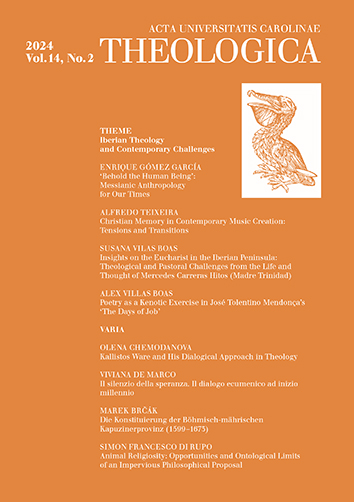AUC Theologica is a peer-reviewed journal for theology published twice a year. As we publish original papers in English, German, French, and Italian, our mission is to serve as a platform both for Czech researchers, who can present their research results in these languages, and for international contributors, who are invited to enter the academic theological discussion in the heart of Europe.
The journal focuses on a wide range of theological disciplines, such as systematic theology, biblical studies, patristic studies, pastoral and spiritual theology, religious education, church history, etc. Within these fields, the journal seeks to reflect the current theological questions and problems, which often requires interdisciplinary approaches. Supporting the intersection of various theological disciplines, we thus also welcome theological papers touching other academic fields including philosophy, sociology, literary studies, and science.
Each issue consists of two sections. The thematic section presents papers of the same focus. The section called ‘Varia’ invites papers dealing with various theological themes from the perspective of all Christian traditions. Our current and past issues are approachable for free on this website in the form of Open Access.
AUC THEOLOGICA, Vol 5 No 1 (2015), 133–152
Towards a Thomistic Theory of Intentional (“Fictive”) Individuals (I)
Stanislav Sousedík
DOI: https://doi.org/10.14712/23363398.2015.72
published online: 04. 06. 2015
abstract
Following Aristotle’s stimuli, the medieval scholastics produced the theory of beings of reason (= intentional beings), i.e. beings that can only exist as an object of our reason (and in no other way). It is remarkable that an important component was omitted by the scholastic scholars, namely the teaching of intentional (nowadays called “fictional” more frequently) individuals, e.g. Sherlock Holmes, Hamlet, Hephaistos etc. This issue was dealt with later by A. Meinong, E. Mally, T. Parsons and E. N. Zalta. This contribution strives to propose an alternative theory founded on the scholastic, specifically Thomistic thought. The author distinguishes 1) individual description of intentional individual; 2) this individual itself, and 3) its “representative” existing in the real world. An intentional being, in this conception, has only the properties ascribed to it by its description and the property of individuality (and no other property). Nevertheless, an intentional individual bears these properties differently from the real individual. Therefore, the author distinguishes two kinds of predication, the real and the intentional one. In: this context, other logical problems of intentional individuals are addressed. By the “representative” of an intentional individual (e.g. Sherlock Holmes) the author means e.g. its image made by the reader of A. C. Doyle in his (reader’s) fantasy, or a real picture (illustration) in the Hound of Baskerville book, further the actor who plays the role of famous detective in the film adaption of the novel etc. The goal of the contribution is to show that if existence is the first-level predicate, it can be predicated informatively, for as such it is able to distinguish the individuals that exist really from those that do not.
keywords: Thomism; fictional individuals; predication

Towards a Thomistic Theory of Intentional (“Fictive”) Individuals (I) is licensed under a Creative Commons Attribution 4.0 International License.
148 x 210 mm
periodicity: 2 x per year
print price: 100 czk
ISSN: 1804-5588
E-ISSN: 2336-3398
